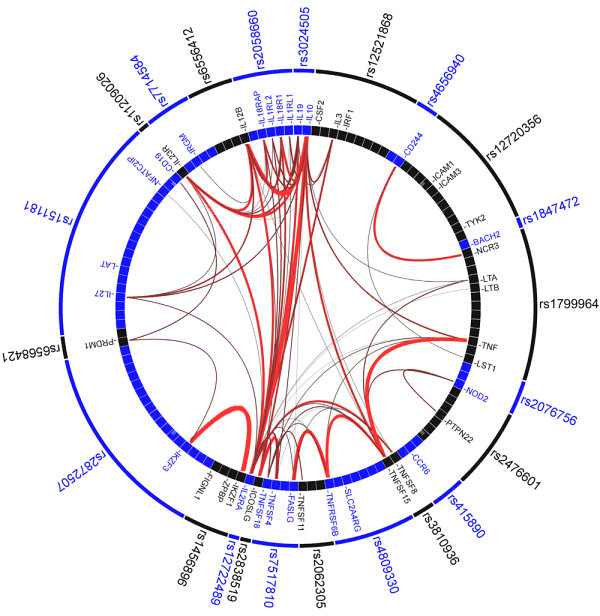39 new genetic associations with Crohn's disease

New research has more than doubled the number of genes known to be linked to Crohn’s disease, bringing the total to 71. The results – published in the journal Nature Genetics – mean that more genes are now associated with Crohn’s than with any other disease.
It was the world’s largest genetic study in inflammatory bowel disease, involving over 22,000 patients and 50 teams of investigators in 15 countries. The research was carried out by the International IBD Genetics Consortium, led by Dr Miles Parkes, consultant gastroenterologist at Cambridge University Hospitals.
“Any of these genes might hold the key to beating Crohn’s disease. If we know that there are abnormal pathways which increase the risk, we can think about targeting them with drugs. The aim is to manipulate them – to block them or turn them off, either before or after the condition appears, to see if it settles the gut inflammation. Ultimately, we want a strategy that stops it developing in the first place.
“We already know that there is an interaction between these abnormal genes and the external triggers that cause Crohn’s to develop or flare up. About 50 per cent of the risk is genetic, and 50 per cent is environmental – possibly involving a common infection like norovirus. This research gives us more information about those potential triggers, and that gives us another area to attack with further research.”
Dr Miles Parkes Consultant gastroenterologist at Cambridge University Hospitals
By analysing the results of six genome-wide association studies, the researchers identified 39 new “susceptibility loci” – regions of the body’s genetic make-up which contain variant genes associated with Crohn’s. Previously, 32 such regions had been known.
The disease affects around 1 in 500 people in the UK, with up to 6,000 new cases diagnosed each year. Most patients become ill between the ages of 18 and 30, with inflammation of the gastrointestinal tract leading to abdominal pain, weight loss, vomiting and diarrhoea. Although many people manage their condition well with medication and a carefully-controlled diet, over the long term up to three quarters of patients will need surgery to remove part of their gut because of Crohn’s-related complications.
One patient who has first-hand experience of the condition is Kayleigh Kew, 22, from London, who developed Crohn’s aged seven and has undergone major surgery twice to remove scar tissue which was blocking her intestine.
“Getting to the bottom of the genetics is a promising first step in finding the cause, and it will give hope to many patients and their families.
“I’m lucky at the moment – infusions of drugs every eight weeks are keeping Crohn’s at bay. But I will undoubtedly suffer bouts of relapse in the future, and the disease had a significant effect on my life when I was growing up. I missed large chunks of education due to pain, severe weight loss and fatigue, and I remember my school reports listing 40+ absences for a term. Treatment was often unpleasant – I was regularly unable to eat food for months on end – and the nature of the symptoms meant I was usually too embarrassed to seek support from friends. There have been times when the disease was relentlessly active, medications failed, and there was very little that doctors could do.”
Kayleigh Kew 22, from London, who developed Crohn’s aged seven
Many of the samples were analysed at the Wellcome Trust Sanger Institute, near Cambridge, where work was led by Dr Jeffrey Barrett.
“Within the last two years, it’s become easy to look at about a million areas of the genome that show the most common variations between individuals. Combining the results from several studies gives you a more powerful result than any individual analysis – and that’s what has allowed us to identify these new genes which affect Crohn’s risk.”
Dr Jeffrey Barrett Wellcome Trust Sanger Institute
“This important study offers hope for people such as Kayleigh who are living with the challenges that Crohn’s disease presents. Crohn’s disease is much more common than people think and since these life-long diseases are most frequently diagnosed in young people just starting out in their lives, the need to find a cure or to prevent the diseases occurring is paramount. We hope that the new genetic insights offered by this study will establish a clearer path to these much-needed answers.”
Richard Driscoll Chief executive of Crohn’s and Colitis UK
More information
Funding
A full list of funding agencies is available at the Nature Genetics website.
Participating Centres
A full list of participating centres is available at the Nature Genetics website
Publications:
Selected websites
The Wellcome Trust Sanger Institute
The Wellcome Trust Sanger Institute, which receives the majority of its funding from the Wellcome Trust, was founded in 1992. The Institute is responsible for the completion of the sequence of approximately one-third of the human genome as well as genomes of model organisms and more than 90 pathogen genomes. In October 2006, new funding was awarded by the Wellcome Trust to exploit the wealth of genome data now available to answer important questions about health and disease.
The Wellcome Trust
The Wellcome Trust is a global charitable foundation dedicated to achieving extraordinary improvements in human and animal health. We support the brightest minds in biomedical research and the medical humanities. Our breadth of support includes public engagement, education and the application of research to improve health. We are independent of both political and commercial interests.


